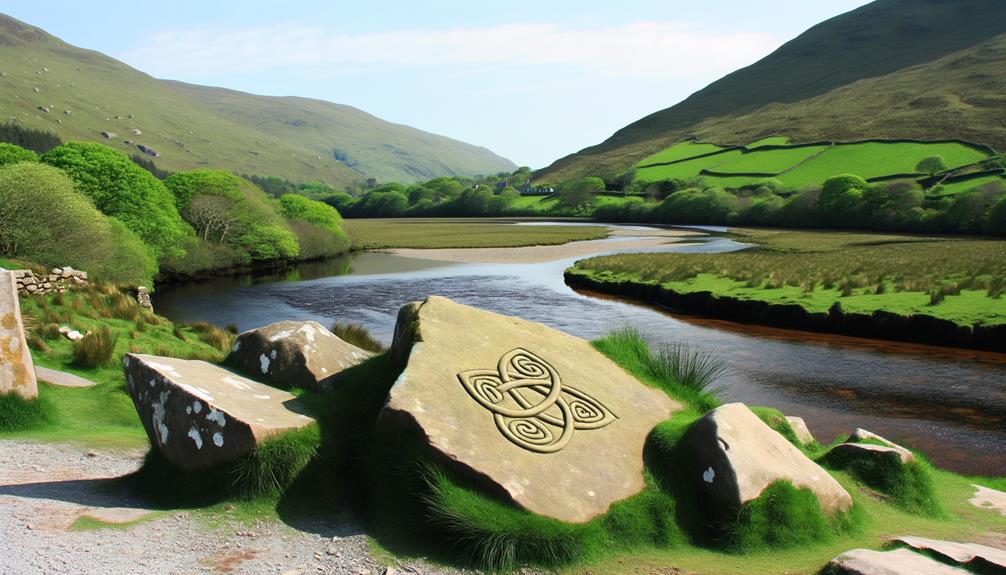Colm Name Origin and Meaning
The name Colm, rooted in the Latin term 'Columba' meaning 'dove,' signifies peace and purity. It emerged prominently in Gaelic and Celtic traditions, particularly through Saint Columba, a key figure in early Irish Christianity.
The name has woven itself intricately into Irish heritage, appearing in manuscripts, folklore, and annals. Its symbolism extends to spiritual leadership and tranquility, reflecting the dove's universal representation of peace.
Despite its fluctuating popularity, Colm has retained a distinctive cultural and religious significance. For a deeper understanding of its historical context and enduring legacy, there is more to uncover.

Key Takeaways
- Colm is derived from the Old Irish 'Colum' and Latin 'Columba,' meaning 'dove.'
- The name symbolizes peace, purity, and spiritual leadership.
- Saint Columba's influence made Colm significant in early Irish Christianity.
- Colm is deeply rooted in Irish folklore, manuscripts, and cultural heritage.
- Its popularity has fluctuated but remains prevalent due to Irish cultural revival.
Historical Background
Although often associated with Ireland, the name 'Colm' has ancient roots that trace back to early Gaelic and Celtic traditions. Historically, 'Colm' derives from the Old Irish 'Colum,' linked to the Latin 'Columba,' meaning 'dove.' This connection emphasizes qualities of peace and gentleness, traits revered in Celtic culture.
The name gained prominence through Saint Columba (521-597 AD), a key figure in early Irish Christianity who founded the influential monastic community on the island of Iona. His missionary work and scholarly contributions cemented the name's status within Ireland and Scotland.
Over centuries, 'Colm' evolved, reflecting the linguistic shifts within Gaelic-speaking regions, yet its foundational association with tranquility and spiritual leadership remains unchanged.
Latin Roots
The name ‘Colm’ finds its etymological roots in the Latin term ‘Columba,’ which translates to ‘dove’ and symbolically represents peace and purity in both religious and cultural contexts. The name Colm is popular in Irish and Scottish cultures, and is often associated with the virtues of gentleness, harmony, and spirituality. This name has also been linked with Saint Colm Cille, a revered figure in Celtic Christianity who is known for his wisdom and compassion. For more information on the <colette name meaning>, one can consult historical and cultural sources to gain a deeper understanding of the significance of this timeless name.
Historically, the dove has been a powerful emblem, particularly within Christian iconography where it signifies the Holy Spirit. This association underscores the name's connotation of tranquility and sanctity.
Columba was significantly borne by Saint Columba of Iona, an influential missionary credited with spreading Christianity in Scotland during the 6th century. The adaptation of 'Columba' into 'Colm' further illustrates the name's enduring legacy, seamlessly blending its Latin origin with regional linguistic evolution.
Consequently, the name 'Colm' encapsulates a rich tapestry of historical and symbolic significance, rooted deeply in its Latin antecedents.
Irish Heritage
Emerging from its Latin origins, the name 'Colm' has been intricately woven into the fabric of Irish heritage, embodying both cultural importance and historical depth. The adoption and adaptation of 'Colm' in Ireland can be traced back to the early Christian period, where it became associated with notable saints and scholars.
Key points highlighting its Irish heritage include:
- Saint Colm Cille (Columba): A 6th-century Irish monk whose missionary work profoundly impacted Irish and Scottish Christianity.
- Historical Literature: Mentioned in various Irish manuscripts and annals, indicating its longstanding presence.
- Cultural Resonance: Commonly used in Irish folklore and storytelling, reflecting its deep-rooted cultural significance.
- Modern Usage: Continues to be a popular name in Ireland, bridging historical legacy with contemporary identity.
This intricate interplay between history and culture illustrates the name's enduring legacy in Irish society.
Symbolism of the Dove
The dove, historically revered across various cultures, epitomizes peace and tranquility, symbolizing harmony in both personal and societal contexts.
Additionally, its role as a spiritual messenger is deeply embedded in religious traditions, where it represents divine communication and guidance.
Understanding these aspects provides a richer comprehension of the name 'Colm', which is derived from the Irish word for dove.
Peace and Tranquility
Colm's etymological roots trace back to the Latin word 'columba,' signifying a dove and embodying peace and tranquility throughout historical contexts. The dove has long been a universal symbol of serenity, often depicted in various cultural and religious iconographies. This bird's calm demeanor and gentle nature underscore its association with harmony and quietude.
- Ancient Greek Mythology: Doves were sacred to Aphrodite, symbolizing love and peace.
- Christianity: The dove represents the Holy Spirit, epitomizing purity and divine tranquility.
- Islamic Culture: The dove is esteemed for its peaceful connotations, often linked to divine protection.
- Ancient Roman Society: Doves were seen as omens of peace and were released to signify the end of conflicts.
This enduring symbolism enriches the name Colm with profound cultural significance.
Spiritual Messenger Role
In various spiritual traditions, the dove has been revered as a messenger between the divine and the earthly domains, symbolizing profound communication and guidance. This symbolism is deeply rooted in historical texts where the dove often appears as a harbinger of hope and divine will. For instance, in Christianity, the dove represents the Holy Spirit, conveying messages of peace and sanctity. Similarly, ancient Greek mythology associates the dove with Aphrodite, the goddess of love, signifying divine intervention in human affairs.
| Tradition | Symbolism |
|---|---|
| Christianity | Holy Spirit |
| Greek Myth | Aphrodite's Messenger |
| Judaism | Peace and Purity |
| Islam | Divine Inspiration |
Understanding these symbolic roles enhances the name Colm, derived from the Irish word for dove, embedding it with rich spiritual significance.
Popularity Over Time
Tracing the popularity of the name Colm reveals intriguing fluctuations across different historical periods and cultural landscapes. Initially rooted in early Christian Ireland, Colm experienced significant popularity during the medieval period, particularly among monastic communities. However, its prevalence diminished during the 18th and 19th centuries, coinciding with broader socio-political changes in Ireland.
In contemporary times, the name has witnessed a resurgence, particularly due to:
- Revival of Irish cultural identity: Increased interest in traditional names.
- Media influence: Presence in literature and film.
- Diaspora dynamics: Irish communities abroad embracing heritage.
- Celebrity endorsements: Popular public figures bearing the name.
This analysis illustrates that the name Colm's popularity is closely linked to cultural and societal trends.
Famous People Named Colm
The name Colm has been borne by several notable figures across various fields, enhancing its cultural significance.
Distinguished actors such as Colm Meaney and Colm Feore have brought the name to prominence through their acclaimed performances in film and television.
Additionally, the literary world has seen influential authors like Colm Tóibín, whose contributions have enriched contemporary literature.
Renowned Actors Named Colm
Among the distinguished actors sharing the name Colm, Colm Meaney and Colm Feore have achieved significant acclaim for their contributions to film and television.
Colm Meaney, an Irish actor, is celebrated for his roles in 'Star Trek: The Next Generation' and 'Star Trek: Deep Space Nine,' embodying Chief Miles O'Brien. His filmography extends to numerous critically acclaimed films.
Colm Feore, a Canadian actor, is renowned for his versatility, with notable performances in 'The Chronicles of Riddick,' 'Chicago,' and as Sir Reginald Hargreeves in 'The Umbrella Academy.'
Key accomplishments include:
- Extensive television and film careers
- Recognition in both science fiction and drama genres
- Award-winning performances
- Contributions to international cinema and television
Their careers exemplify the impact of actors named Colm.
Authors With Name Colm
Building on the legacy of notable actors, the literary world also boasts distinguished authors named Colm, whose works have left an indelible mark on contemporary literature. From fiction to non-fiction, these writers have enriched the literary tapestry with their unique voices and profound insights.
| Author | Notable Works |
|---|---|
| Colm Tóibín | "Brooklyn," "The Master" |
| Colm McCann | "Let the Great World Spin," "TransAtlantic" |
| Colm Keena | "Haughey's Millions," "The FitzPatrick Tapes" |
| Colm O'Regan | "Boloxology," "Ann Devine: Handle With Care" |
| Colm Tóibín (2) | "House of Names," "Nora Webster" |
These authors, through their eloquent prose and compelling narratives, continue to shape and influence modern literary discourse. Their contributions resonate deeply with readers around the globe, emphasizing the lasting impact of the name Colm in literature.
Variations and Pronunciations
In exploring the variations and pronunciations of the name Colm, one finds a rich tapestry influenced by regional dialects and historical linguistic changes. Colm, primarily of Irish origin, has several variations and phonetic interpretations. Pronounced as 'KAWL-um' in Ireland, it is sometimes anglicized to 'KOL-em' or 'KAWL-em' in English-speaking regions.
Such differences arise from:
- Geographical influences: Regional accents and linguistic traditions.
- Historical transformations: Evolution of language over centuries.
- Cultural integration: Adaptation in non-Irish communities.
- Orthographic variations: Differences in spelling affecting pronunciation.
These factors contribute to the rich diversity in the name's pronunciation and spelling, reflecting a nuanced interplay of language and culture. Understanding these variations offers insight into the broader linguistic heritage of the name Colm.
Cultural Significance
The name Colm holds profound cultural significance, particularly in Irish tradition, where it is often associated with historical figures and literary works that have shaped the nation's heritage. Derived from the Latin 'Columba,' meaning 'dove,' it symbolizes peace and sanctity.
Saint Colm Cille, also known as Columba, was a pivotal figure in early Irish Christianity and played a vital role in the spread of monasticism across Ireland and Scotland.
In literature, Colm appears in various Gaelic poems and stories, embodying the spirit of Irish identity and resilience. The name's enduring popularity reflects its deep roots in Irish cultural and religious history, resonating with themes of spirituality, leadership, and cultural pride.
Conclusion
The name Colm, steeped in rich historical and cultural contexts, derives its significance from Latin and Irish roots, embodying tranquility and peace through its association with the dove. Its enduring popularity and presence among notable figures underscore its timeless appeal.
Yet, the true intrigue lies in its profound symbolism and the layers of meaning it continues to reveal. As the name Colm transcends generations, one ponders: what deeper resonance might it still hold in the evolving tapestry of human identity?






